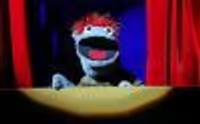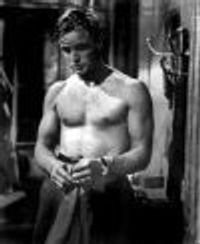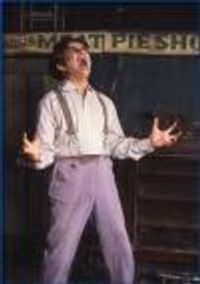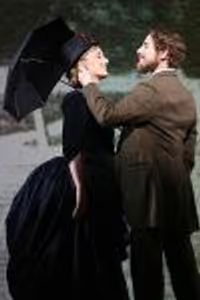Writing the Book for a Musical: A Misunderstood Art
Broadway Forever2
Leading Actor Joined: 3/7/16
#25Writing the Book for a Musical: A Misunderstood Art
Posted: 5/11/16 at 1:14am
to me it comes off as him discounting the nomination or saying they only voted for it because it's "Hamilton" when it's always been like that. Anyway it will most likely win. It's not like there's much competition in best book.
neonlightsxo
Broadway Legend Joined: 7/29/08
#26Writing the Book for a Musical: A Misunderstood Art
Posted: 5/11/16 at 8:46am
The Distinctive Baritone said: "True, true...I guess Isherwood and I are just old souls..."
No. You're literally just wrong. Also, Alain Boublil begs to differ.
"Don't critics feel any need to educate themselves on the art form they criticize?"
Most, yes. Isherwood? No.
Updated On: 5/11/16 at 08:46 AM
#27Writing the Book for a Musical: A Misunderstood Art
Posted: 5/11/16 at 8:54am
Broadway Forever2 said: "to me it comes off as him discounting the nomination or saying they only voted for it because it's "Hamilton" when it's always been like that. Anyway it will most likely win. It's not like there's much competition in best book."
Wouldn't surprise me- it's been pretty evident all season that Isherwood thinks Hamilton is overrated, much like his feelings towards Fun Home last year.
#28Writing the Book for a Musical: A Misunderstood Art
Posted: 5/11/16 at 9:42am
Marsha Norman - THE COLOR PURPLE comes to mind...not sung through, but in addition to dialogue, she structured the show...
#29Writing the Book for a Musical: A Misunderstood Art
Posted: 5/11/16 at 10:03am
Sit down, neonlights. And please actually read my posts next time.
#30Writing the Book for a Musical: A Misunderstood Art
Posted: 5/11/16 at 10:03am
In the example of Hamilton, Miranda did meticulous research and structuring of a show that covers three decades of history. He condensed the first several dozen pages of Chernow's book into a 4-minute opening number. That is beyond writing music and lyrics. Hamilton is not a revue or a concert or a staged album. It has a dramatic structure.
SueBee06
Stand-by Joined: 1/12/16
#31Writing the Book for a Musical: A Misunderstood Art
Posted: 5/11/16 at 12:08pm
I think part of the issue that is adding to the misconception is the word book. That implies words written, like a book you take out from a library, yes? Although the title is "Book writer," it is a title that doesn't begin to encompass what they do because book in their title isn't used in the literal, physical sense. Yes, if there is dialogue, they write it. But the title "Story Creator" wouldn't be wrong either, nor would "Story Architect" or "Story Structural Engineer." I can come up with more ridiculous ones, but I think that gives you a better idea.
I thought the comparison of a book writer only being responsible for the dialogue to an architect only being responsible for the siding to be an apt one.
#32Writing the Book for a Musical: A Misunderstood Art
Posted: 5/11/16 at 12:30pm
It is inconceivable to me that he should have been allowed to say this in the New York Times. I am glad the librettists of the Dramatists Guild united to correct the record.
Arthur Laurents must be rolling in his grave in high dudgeon.
neonlightsxo
Broadway Legend Joined: 7/29/08
#33Writing the Book for a Musical: A Misunderstood Art
Posted: 5/11/16 at 12:59pm
"I thought the comparison of a book writer only being responsible for the dialogue to an architect only being responsible for the siding to be an apt one."
Agreed.
#34Writing the Book for a Musical: A Misunderstood Art
Posted: 5/11/16 at 1:06pm
GavestonPS said: "Don't critics feel any need to educate themselves on the art form they criticize? Whether they should read source material in advance is debatable. (Myself I think doing so tends to invite them to write their own adaptation in their heads and then critique on the basis of that imaginary work.)
"
Frankly I would almost rather they were not familiar with the source material when reviewing the work--but of course this is impossible to control, especially when the source material is particularly well known.
But I agree with the gist of most here. However I never realized that Cats, a show I like, won best book. Lol. I mean it must have been a weak year because the dramatic structure of Cats is hardly one of its good points.
#35Writing the Book for a Musical: A Misunderstood Art
Posted: 5/11/16 at 1:07pm
I am sorry to have been late to this conversation, as I think it is a critically important one. It's heartening to see so many similarly minded people who resent a comment like the one Isherwood made. "Inconceivable," as Joey said, is really the only way to describe it. I want to say something along the lines of "keep fighting the good fight," but it's totally beyond me how this topic is something we need to foster knowledge/awareness of in this community in the first place. Sigh.
#36Writing the Book for a Musical: A Misunderstood Art
Posted: 5/11/16 at 1:50pm
Yes, I think we can all agree that the theatre world needs to all be on board with the "updated" definition of book writer for a musical. The days of ten minute book scenes a la My Fair Lady are mostly a thing of the past anyway.
I never meant to deny the contributions of book-writers of sung-through (or nearly sung-through) shows, I was just trying to point out the inconsistencies of usage and understanding of the job by both the public and theatre professionals alike. Isherwood was going by the "old" definition of the job, which has now appropriately been updated by the Dramatists Guild.
Liza's Headband
Broadway Legend Joined: 5/28/13
#37Writing the Book for a Musical: A Misunderstood Art
Posted: 5/11/16 at 2:49pm
The Distinctive Baritone said: "Yes, I think we can all agree that the theatre world needs to all be on board with the "updated" definition of book writer for a musical. The days of ten minute book scenes a la My Fair Lady are mostly a thing of the past anyway.
I never meant to deny the contributions of book-writers of sung-through (or nearly sung-through) shows, I was just trying to point out the inconsistencies of usage and understanding of the job by both the public and theatre professionals alike. Isherwood was going by the "old" definition of the job, which has now appropriately been updated by the Dramatists Guild.
"
Can you point to an authenticated source for this "old" definition you keep harping on?
neonlightsxo
Broadway Legend Joined: 7/29/08
#38Writing the Book for a Musical: A Misunderstood Art
Posted: 5/11/16 at 3:29pm
There isn't one, so he won't be able to.
leefowler
Broadway Star Joined: 7/13/04
#39Writing the Book for a Musical: A Misunderstood Art
Posted: 5/11/16 at 5:12pm
I'm with Distinctive Baritone on this, actually....
The definition of "book" is different when the show is sung through.
Look at show like "Hello Dolly." It's clear what the book to that show is...it's the dialogue. No one says that Thornton Wilder co-wrote the book to Dolly because he created the characters and storyline. It's quite simple with a show like "Hello Dolly", you've got talking, music, and lyrics.
With a sung through show, there's no dialogue, so the definition of "book" changes. Now, "book" refers to storyline, characters, setting, etc., but not to the actual words. It's interesting that James Lapine is a co-writer of the book to Falsettos, because he's probably the only book writer in history who didn't actually write any of the words to the book he co-created. In all other sung through shows (to my knowledge...) the lyricist and the book writer are the same person.
In a traditional book musical, the definition of "book" is concrete...It's the words people say (and the plot set in motion by the words they say.). The definition of "book" becomes harder to pin down when there are no spoken words. If all musicals had always been sung through, no one would have ever created a separate Tony award for "book."
I'm perfectly happy for shows like Evita and Hamilton to win awards for best book, and it was weird for Isherwood to be unaware that shows like Evita had already won that award. But when someone says, "I thought "book" meant the talking", I can understand the confusion.
#40Writing the Book for a Musical: A Misunderstood Art
Posted: 5/11/16 at 5:27pm
leefowler said "In all other sung through shows (to my knowledge...) the lyricist and the book writer are the same person."
American Idiot had the same situation. Billy Joe Armstrong (lyricist) and Michael Mayer (director) shared credit for the book, just as Finn and Lapine did.
leefowler said "No one says that Thornton Wilder co-wrote the book to Dolly because he created the characters and storyline."
Referring to the source material is a whole other question. When we make an argument for book writers "creating" the characters and storylines, we don't mean that they are LITERALLY creating the characters for the first time ever. Lin-Manuel didn't INVENT Alexander Hamilton or the events of his life. The Tony voters didn't nominate him for the brilliant idea to have Burr shoot Hamilton. Similarly, Michael Stewart did not INVENT the storyline of Hello Dolly from thin air, but that doesn't mean he didn't have to structure the show, and have to decide which elements of The Matchmaker to include and exclude.
Perhaps using Wilder's plots and storylines made Stewart's job easier, just as using the structure Ron Chernow's biography made LMM's job as a book writer easier (part of the reason we give props to people who write fully original musicals). But that doesn't mean it wasn't part of their job.
#41Writing the Book for a Musical: A Misunderstood Art
Posted: 5/11/16 at 5:28pm
I enjoyed the article as well.
leefowler
Broadway Star Joined: 7/13/04
#42Writing the Book for a Musical: A Misunderstood Art
Posted: 5/11/16 at 5:44pm
Interesting that both Michael Mayer and James Lapine received book writing credits for those shows. I would argue that their jobs would be more accurately defined as directing than book writing, though.
#43Writing the Book for a Musical: A Misunderstood Art
Posted: 5/11/16 at 6:11pm
leefowler said: "In all other sung through shows (to my knowledge...) the lyricist and the book writer are the same person."
A couple more examples, both ALW-related: the composer was credited for the book of Aspects of Love (or at least he was nominated for a Tony for it); likewise with Phantom of the Opera (jointly with Richard Stilgoe, who did write some lyrics).
He's also credited as the bookwriter for Whistle Down the Wind, along with two others, but that show does have some dialogue scenes.
#44Writing the Book for a Musical: A Misunderstood Art
Posted: 5/11/16 at 6:30pm
Liza's Headband and neolights -
Let me try yet again to be more clear. Because sung-through musicals are still a relatively new thing (new as in having been mostly a rarity until the British poperetta explosion in the 80's), many people still think of the "book" for a musical is merely the dialogue, because that's pretty much what it used to be. The story/structure was usually a collaboration between the composer, lyricist, book writer, and even the director or producer (Hal Prince himself came up with the idea of the Emcee in Cabaret). However, to view the book writer as merely responsible mostly for the dialogue is an archaic way of defining the book of a musical in light of the increasing popularity of sung-through musicals. I agree with Doug Wright and the Dramatists Guild that the definition of "book writer" needs to be updated.
Some classic "traditional book musicals" (a term that has been created by theatre scholars for good reason): Fiddler on the Roof, My Fair Lady, Carousel, 1776, She Loves Me...okay, really, anything written prior to the 1980's except for Jesus Christ Superstar and a few others. The structure is song/dialogue scene/song/dialogue scene pretty much the whole show.
Some modern "traditional book musicals): Urinetown, The Producers, Wicked, etc.
Do I have a source for this "old" definition? Yes - over twenty years of theatrical study, practice, and experience. I make my career in the theatre as an actor, director, and teacher so I do know what I'm talking about.
So for the last time, yes, the traditional definition of a book writer for a musical needs to be updated. And thanks to Doug Wright and the Dramatists Guild, it has been. Yay. The end.
Videos







